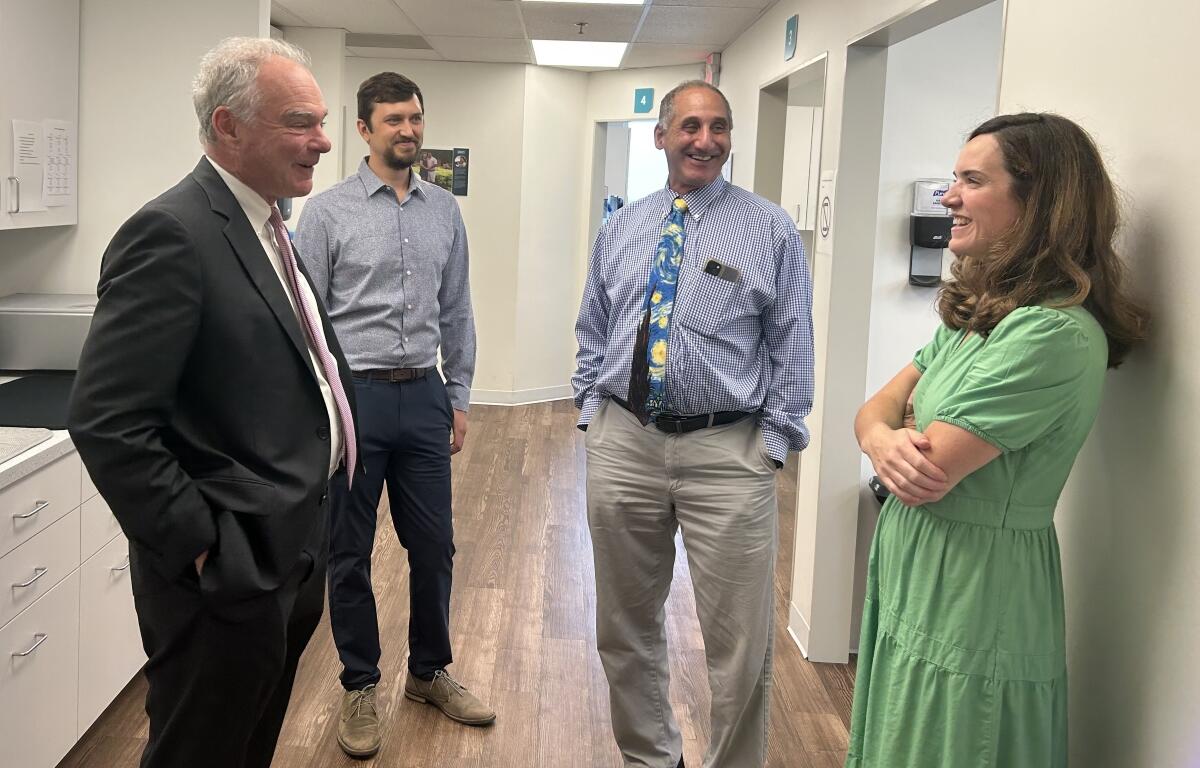CHARLOTTESVILLE, VA (CVILLE RIGHT NOW) – Emily Little worked as an emergency room nurse before taking a position at the Charlottesville Free Clinic about three years ago. During a roundtable discussion about the clinic’s work and about national healthcare issues, Little told Sen. Tim Kaine what she’s found in her new job is, “a model for what all of healthcare could be.”
“This is what it could look like if we had universal care,” Little said. “It’s possible. We have a nursing shortage and also a physician shortage because they’re not doing the kind of stuff they used to be able to do. But we’re doing it here. It’s possible.”
During the hour-long conversation, Kaine heard from executives and staff at the clinic, as well the executive directors of the free clinics in Orange and Greene County.
Officials shared their concern that cuts to Medicaid coming down from the federal government could lead to an influx of new patients needing care that might overwhelm the clinics. The three clinics closing in August County came up multiple times as the type of ripple effect that will impact free clinics and emergency rooms alike.
“With these latest Medicaid cuts, we’re looking at 17 million more people across the country losing their health insurance,” Dr. Mo Nadkarni told Kaine. “We’re looking at the subsidies for Obamacare going away, and people dropping off those rolls. … We’re very nervous that we’re going to get overrun with new patients that need more care, that were getting care elsewhere.”
For Kaine, that was an important piece of information.
“I needed to be reminded that even though most free clinics don’t apply for Medicaid reimbursements, the Medicaid cuts will affect them dramatically because people losing Medicaid losing Medicaid and health insurance will end up coming to free clinics,” Kaine said after the event. “It affects the number of people coming in the door.”
Willa Barnhardt, executive director of the Charlottesville Free Clinic, told Kaine the operation employs 21 staff members, full and part-time. Much of the work is done by a team of about 600 volunteers, she said. The clinic gets over 60% of its funding through donations and grants. Another 30% comes from the city, county and state.
That work includes seeing over 3,000 patients a year, over some 8,000 clinic visits.
Still, officials told Kaine the clinic is only getting service to about 21% of the people in the area who need help accessing healthcare.
Kaine heard concerns about possible work requirements for Medicaid, as speakers noted finding 20 hours of work or volunteer opportunities a week can be difficult in the current economy, and that transportation issues can also be an obstacle to clearing that hurdle.
He was told that lack of housing and affordable housing have complicated patient care.
In Greene County, they are seeing a rise in homeless patients, a new issue for the free clinic, executive director Pam Morris said.
Officials told the senator that diabetes, depression and anxiety, and nutrition issues are all trending up in the region, more reasons that the work of free clinics is increasingly important.
At the Charlottesville clinic, patients are normally seen within a few days of calling. Initially, the clinic takes, essentially, all comers, then determines if they might be eligible for care elsewhere.
“Some of our patients work two jobs,” Barnhardt said. “They’re not allowed to work enough hours to get health insurance at that job. So, after two jobs, they’re coming to the free clinic because they know they can be seen.”
Every patient is screened for depression and anxiety issues, part of the integrated approach to medicine the clinic employs.
Patients can get medical, dental and mental health care all under one roof. The clinic also has its own pharmacy, helping patients get their medications and allowing the clinic to follow up to make sure those medications are picked up, taken and, when needed, refilled.
It’s an approach the people who work and volunteer there find both effective and invigorating.
Board chairperson Dr. Will Knight called it “a dream world,” while Dr. Sandhya Chhabra, the board secretary, said, “It is truly the way medicine should be practiced.”
“It helps me imagine what healthcare could look like if we weren’t bogged down by billing,” Little said. “If we weren’t bogged down by going after, ‘Is this person approved for this thing?’ It is a different form of medicine that’s being done at this place. And I think this is a model for what all of healthcare could be.”



